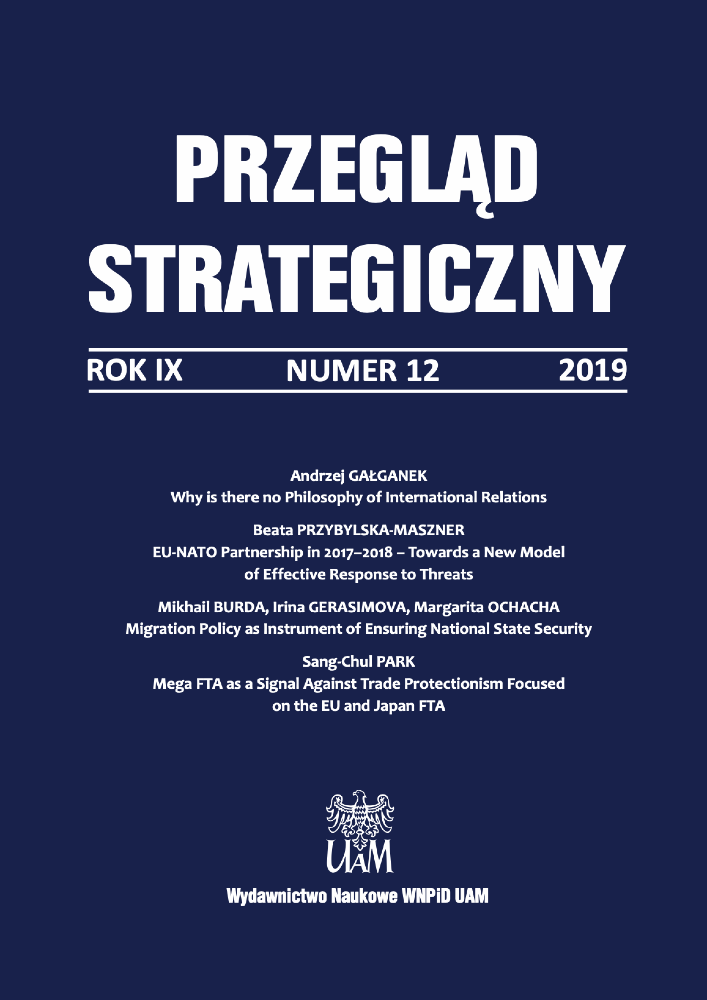Abstrakt
Artykuł ma na celu przedstawienie wody, jako broni używanej w wojnie w basenie rzek Tygrysu i Eufratu, a także roli i znaczenia wody dla nowej architektury globalnego bezpieczeństwa. Głównym celem jest znalezienie odpowiedzi na pytanie badawcze, czy woda w basenie Tygrysu i Eufratu będzie nadal narzędziem walki, czy współpracy, jako skuteczne narzędzie do sprostania wyzwaniom strategicznym. Hipotezą jest stwierdzenie, że wyzwania związane z wodą w dorzeczu Eufratu i Tygrysu będzie przede wszystkim podążać za stosunkami społecznymi i polityczno-gospodarczymi pomiędzy Turcją, Irakiem i Syrią oraz czynnikami zewnętrznymi. Badania przeprowadzono metodą opisowo-analityczną. Ponadto badania oparto na neorealistycznej teorii stosunków międzynarodowych oraz koncepcji międzynarodowej analizy konstelacji, a także teorii neoinstytucjonalizmu. Przyszła anarchiczna globalna architektura bezpieczeństwa doprowadzi do hegemonicznego systemu stosunków wodnych. Dlatego też, bez międzynarodowej koordynacji i dalekosiężnej strategii w obliczu pojawiającej się anarchicznej globalnej struktury bezpieczeństwa, stabilna współpraca wodna w tym regionie nie jest możliwa.
Bibliografia
Abdelraouf M. (2018), West Asia Regional Cooperation on Water and Sustainable Development Goal 6, “EDA Insight”, October, http://eda.ac.ae/docs/default-source/Publications/eda-in- sight_wa-water-diplomacy_en_final.pdf?sfvrsn=2.
Amin A. (2017), The Age of Renewable Energy Diplomacy, “EDA Reflection”, October, http://eda.ac.ae/docs/defaultsource/Publications/eda_reflection_age_of_renewable_energy_ en.pdf?sfvrsn=2.
Ban Ki-moon (2016), Remarks to Security Council debate on Water, Peace and Security, United Nations Secretary General, 22.11.2016, https://www.un.org/sg/en/content/sg/speeches/2016- 11-22.
Cahan J. (ed.) (2017), Water Security in the Middle East, “Essays in Scientific and Social Coopera- tion”, Publisher: Anthem Press, Series: Anthem Water Diplomacy Series.
Cleveland C. (2010), China’s Monster Three Gorges Dam is About To Slow The Rotation Of The Earth, “Business Insider”, June 18, https://www.businessinsider.com/chinas-three-gorges- dam-really-will-slow-the-earths-rotation-2010-6.
Cuppari R. (2017), Water Diplomacy, International Centre for Water Resources and Global Change, Policy Brief Number 1/2017, http://www.waterandchange.org/wp-content/uploads/2017/06/ PB_WaterDiplomacy_lowres.pdf.
David M., Passarelli R. (2015), Conflict Basins: Powderkegs to Paecepipes, “SAIS Review”, Vol. 35, No. 1, Winter–Spring.
Deen T. (2014), U.N. Decries Water as Weapon of War in Military Conflicts, United Nations, IPS, May 19, http://www.ipsnews.net/2014/05/u-n-decries-water-as-weapon-of-war-in-military- conflicts/.
EU (2013), Council Conclusions on EU Water Diplomacy, Foreign Affairs Council, Brussels, 22 July, http://www.europarl.europa.eu/meetdocs/2009_2014/documents/droi/dv/1407_ councilconclusions_/1407_councilconclusions_en.pdf.
Government Offices of Sweden, Ministry of Foreign Affairs, Strategy for Sustainable Peace 2017–2022, https://www.government.se/490051/globalassets/government/block/fakta-och- genvagsblock/utrikesdepartementet/sanktioner/strategi-hallbar-fred-eng-slutlig.pdf.
Handy N. (2011), Turkey’s Shifting Relations with its Middle East Neighbors during the Davutoğlu Era: History, Power and Policy, Bilgi (23), Yaz.
Hefny M. (2011), Water Diplomacy: A Tool for Enhancing Water Peace and Sustainability in the Arab Region, “Technical Document”, Cairo, November, http://www.unesco.org/new/fileadmin/MULTIMEDIA/FIELD/Cairo/Water%20Diplomacy%20in%20Action%20Strategy%20Doc%203%20Rev%202%20Final%20and%20Action%20Plan%5B1%5D.pdf.
Huntjens P., de Man R. (2017), Water diplomacy: Making water cooperation work, The Hague Insti- tute Policy Brief, April, https://www.planetarysecurityinitiative.org/sites/default/files/2017- 04/PB_Water_Diplomacy_WG_4.pdf.
IPI (2018), Experts Call for Preventive “Water Diplomacy” in the MENA Region, (April 11), https:// www.ipinst.org/2018/04/preventive-water-diplomacy-mena-region#4.
IRENA (2018), Medium-term Strategy 2018–2022, Report of the Director-General of the Interna- tional Renewable Energy Agency, Eighth session of the Assembly, Abu Dhabi, 13–14 Janu- ary, https://www.irena.org/-/media/Files/IRENA/Agency/About-IRENA/Assembly/Eighth-Assembly/A_8_11_MTS-2018-2022.pdf?la=en&hash=07546C5D6CB968EEEDBEBE322 136DEF2AB389AFB.
Kamphof R., Melissen J. (2018), Foreign Ministries, SDG Diplomacy and the Private Sector, SWP Working Paper No. 22, April, https://www.swp-berlin.org/fileadmin/contents/products/ arbeitspapiere/WP_Diplomacy21_No22_Kamphof_Melissen.pdf.
Kibaroglu A. (2017), State-of-the-art review of transboundary water governance in the Euphrates Ti- gris river basin, “International Journal of Water Resources Development”, 07 Dec, https:// aquadoc.typepad.com/files/review_tb_water_governance_euphrates_tigris.pdf.
Kibaroglu A. (2015), Transboundary Water Governance in the Euphrates Tigris River Basin, “E- International Relations”, Jul 22, https://www.e-ir.info/2015/07/22/transboundary-water-gov- ernance-in-the-euphrates-tigris-river-basin/.
Kibaroglu A. et al. (2011), Turkey’s Water Policy, DOI 10.1007/978-3-642-19636-2_16, # Spring- er-Verlag Berlin Heidelberg 2011, https://www.iraqicivilsociety.org//wp-content/uploads/ 2013/02/Kibaroglu-scheumann-euphrates-tigris-river-system.pdf.
Kjellén B. (2004), Pathways to the Future: The New Diplomacy for Sustainable Development, “IDS Bulletin” 35(3): 107–113, DOI 10.1111/j.1759-5436.2004.tb00143.x.
Leight N. (2012), Water & Public Diplomacy, “Policy Brief”, April, https://www.uscpublicdiplomacy.org/sites/uscpublicdiplomacy.org/files/useruploads/u22281/Water_Diplomacy_Poli- cy_Brief_Online.pdf.
Menga F. (2016), Domestic and International dimensions of transboundary water politics, “Water Alternatives”, Vol. 9 (3), http://www.water-alternatives.org/index.php/alldoc/articles/vol9/ v9issue3/322-a9-3-17/file.
Motwani P. R. (2017), Water Cooperation Quotient, Strategic Foresight Group, Mumbai, https://www.strategicforesight.com/publication_pdf/Water%20Cooperation%20Quotient%202017. pdf.
OSCE (2014), Enhancing security through water diplomacy: The role of the OSCE, OSCE, Hofburg, 8 July, (SEC.DAYS/9/14/Rev.1), https://www.osce.org/sg/120018?download=true.
OSCE (2019), Environment and Security, (ENVSEC) Initiative, (07/04/2019), https://www.osce.org/ secretariat/ENVSEC.
OSCE (2014), Water diplomacy, 1 July, https://www.osce.org/sg/120614.
Pacific Institute (2019), Water Conflict Chronology, Pacific Institute, Oakland, CA. (27.08.2019), https://www.worldwater.org/water-conflict/.
Scheumann W., Shamaly O. (2016), The Turkish-Syrian Friendship Dam on the Orontes River: Benefits for All?, in: Water Resources Management in the Lower Asi-Orontes River Basin: Issues and Opportunities, Graduate Institute of International and Development Studies; Istanbul, MEF University, Geneva, https://docs.water-security.org/files/e%20Documents/ Lower%20Asi%20Orontes%202016/Chapter_12.pdf.
Schmeie S. (2018), What is Water Diplomacy and Why Should You Care?, “Global Water Forum”, August 31, http://www.globalwaterforum.org/2018/08/31/what-is-water-diplomacy-and- why-should-you-care/.
SFG (2011), Blue Peace: Rethinking Middle East Water, Strategic Foresight Group, Mumbai, https://www.eda.admin.ch/dam/deza/en/documents/publikationen/Diverses/198458-the-blue- peace_EN.pdf.
SFG (2015), Blue Peace: Rethinking Middle East Water, Strategic Foresight Group, Mumbai, https://www.strategicforesight.com/publication_pdf/28458Lessons%20Learnt.pdf.
SFG (2019), The Blue Strike List in the Middle East, “Blue Peace Bulletin”, Vol 3, https://www.strategicforesight.com/publication_pdf/Blue%20Strike%20List.pdf.
SFG (2017), Water Cooperation Quotient, Strategic Foresight Group, Mumbai, https://www.strategicforesight.com/publication_pdf/Water%20Cooperation%20Quotient%202017.pdf.
Srivastava L. (2014), Strengthening Multilateral Diplomacy and Sustainable Development, “The Magazine of the United Nations”, Vol. LI, No. 3, https://unchronicle.un.org/article/strengthe- ning-multilateral-diplomacy-and-sustainable-development.
Susskind L., Shafiqul I. (2012), Water Diplomacy: Creating Value and Building Trust in Transbound- ary Water Negotiations, “Science & Diplomacy”, Vol. 1, No. 3, September, http://www. sciencediplomacy.org/files/water_diplomacy_science__diplomacy.pdf.
UN (2018), High-Level Panel on Water Diplomacy, Deputy Secretary-General’s remarks, Stockholm (August 27), https://www.un.org/sg/en/content/dsg/statement/2018-08-27/deputy-secretary- generals-remarks-high-level-panel-water-diplomacy.
UN (2014), Strengthening Multilateral Diplomacy and Sustainable Development, “The Magazine of the United Nations” Vol. LI, No. 3, https://unchronicle.un.org/article/strengthening-multilat- eral-diplomacy-and-sustainable-development.
UNWATER (2018), Nature-Based Solutions for Water, “World Water Development Report”, 19 March, http://www.unwater.org/world-water-development-report-2018-nature-based- solutions-for-water/.
Wasinger C. (2015), Peace Be Dammed? Water Power and Water Politics in the Tigris-Euphrates Basin, Bowdoin College Bowdoin Digital Commons Honors Projects 5-2015.
Waslekar S. (2011), Blue Peace: Rethinking Middle East Water, Strategic Foresight Group, https://www.eda.admin.ch/dam/deza/en/documents/publikationen/Diverses/198458-the-blue- peace_EN.pdf.
Wirsing R., Jasparro C. (2007), River rivalry: Water disputes, resource insecurity and diplomatic deadlock in South Asia, “Water Policy” 9 (3), https://doi.org/10.2166/wp.2007.014.
Yıldız D. (2015), Water and H2O Difference in Terms of International Relationship, “World Scien- tific News” 10, www.worldscientificnews.com.
Zhupankhan A., Tussupova K., Berndtsson R. (2017), Could Changing Relationships Lead to Better Water Sharing in Central Asia?, “Water” 9 (20 February).

